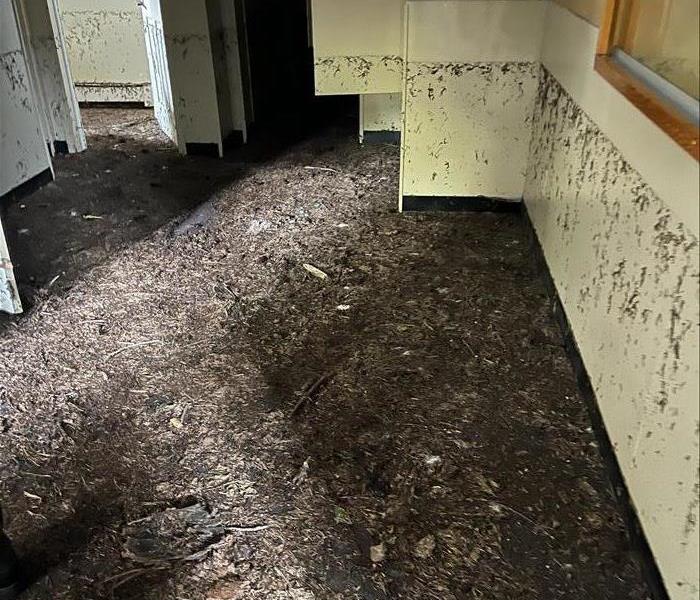Improving Indoor Air Quality: Addressing Mold Growth in Your Home
11/8/2024 (Permalink)
Mold is a common issue that many homeowners face, and its presence can affect various aspects of your home environment. One significant area impacted by mold is indoor air quality. Mold spores, when airborne, can reduce the overall air quality in your living space, making your home feel damp, musty, and less comfortable. While it's often hidden behind walls or under floors, the presence of mold can cause noticeable changes in your home's atmosphere.
Here’s how mold influences indoor air quality and why it’s essential to address mold issues promptly.
How Mold Affects Indoor Air Quality
Mold is a type of fungus that thrives in moist, warm environments. Kitchens, bathrooms, basements, and areas with leaks or high humidity are particularly susceptible. Mold produces spores that become airborne and can travel throughout your home via the HVAC system, open windows, or even through foot traffic.
Musty Odors
One of the most noticeable effects of mold on indoor air quality is the presence of a musty, unpleasant odor. This smell can permeate the entire home, making it uncomfortable and reducing the overall enjoyment of your living space. Even if the mold is hidden behind walls or beneath floors, the odor can spread far beyond the actual mold growth site.
Increased Humidity
When mold grows, it often signals excess moisture in the environment. High humidity levels not only encourage mold growth but also affect the air you breathe. A humid indoor environment can feel heavy, damp, and uncomfortable, contributing to poor indoor air quality. Humidity control is essential to both prevent mold and improve air quality.
Spread of Spores
Mold reproduces by releasing spores into the air. These spores are tiny and lightweight, allowing them to travel throughout your home. When these spores settle on other surfaces, they can lead to the spread of mold to new areas, further degrading indoor air quality. The more spores in the air, the more your home’s air quality can suffer.
Impact on HVAC Systems
Mold spores can enter and circulate through your HVAC system, allowing them to spread throughout your home. Over time, mold can also grow inside the HVAC system, affecting its efficiency and the air that moves through it. When mold enters ducts or filters, it further diminishes air quality by releasing spores every time the system operates.
Preventing Mold for Better Indoor Air Quality
Since mold has a significant impact on air quality, preventing its growth can improve the comfort and cleanliness of your home. Here are some ways to prevent mold and maintain higher air quality.
Control Humidity
Maintaining a proper humidity level (ideally between 30-50%) is crucial for preventing mold growth. Use dehumidifiers in moisture-prone areas like basements and bathrooms. Regularly ventilate kitchens and bathrooms to remove excess steam and moisture.
Fix Leaks Immediately
Water leaks are a leading cause of mold growth. Whether it’s a leaking pipe, roof, or window, addressing water damage as soon as possible will prevent mold from developing. If leaks go untreated, mold can form and spread quickly.
Proper Ventilation
Ensure that your home is well-ventilated. Use exhaust fans in bathrooms and kitchens, and consider installing a whole-house ventilation system to help circulate fresh air. Proper airflow can help reduce moisture levels and prevent mold from settling in.
Keep Surfaces Dry
In areas like kitchens, bathrooms, and basements, it’s important to wipe up spills and standing water immediately. Regularly check under sinks and around windows for signs of water pooling, and make sure to keep these surfaces dry.
Regular HVAC Maintenance
Regularly inspect and clean your HVAC system to prevent mold spores from accumulating in ducts, filters, and coils. Mold can thrive in these areas, so keeping them clean is crucial for maintaining good air quality.
Mold Remediation and Indoor Air Quality Improvement
If you discover mold in your home, addressing it promptly is vital to restoring air quality. Even small amounts of mold can have a significant impact, so it’s best to take action as soon as you spot it.
Professional Mold Remediation
SERVPRO® offers expert mold remediation services that go beyond surface cleaning. They assess the source of the mold, contain the affected area, and remove mold thoroughly to prevent further contamination. Additionally, SERVPRO uses advanced air filtration equipment to capture mold spores, improving the indoor air quality during and after the remediation process.
Air Purification
After mold removal, consider using air purifiers with HEPA filters to help trap any remaining airborne spores and improve the air quality further. These purifiers can capture small particles, including mold spores, and reduce the musty odors associated with mold.
Mold can significantly impact the quality of the air in your home by releasing spores, increasing humidity, and causing unpleasant odors.
If you notice mold or suspect it’s affecting your home’s air quality, SERVPRO® has professional mold remediation services that can help eliminate the problem and restore the comfort of your living space. Taking steps to control mold will not only protect your home but also ensure a fresher, cleaner indoor environment.

 24/7 Emergency Service
24/7 Emergency Service
